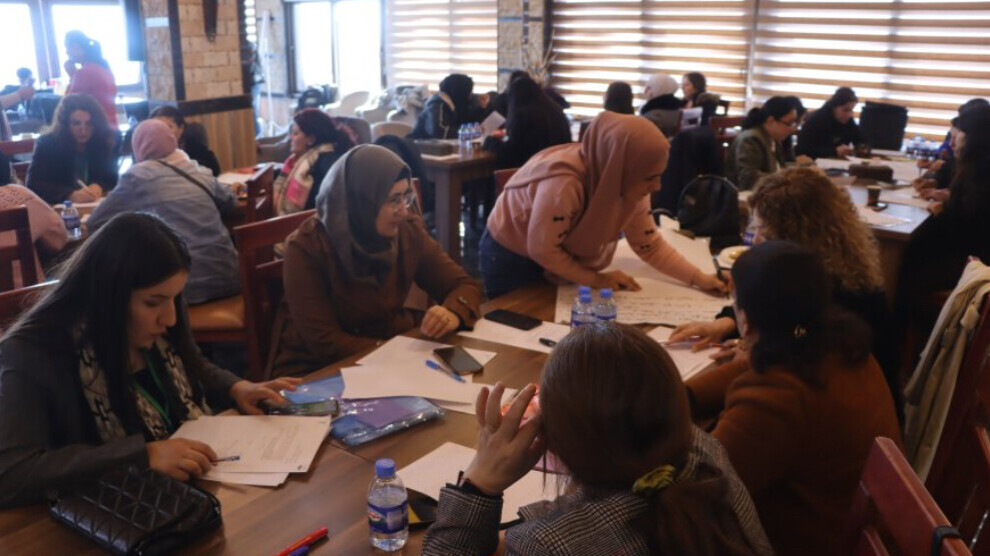Qamishlo Women’s Congress publishes final declaration
The final declaration of the Women’s Congress in Qamishlo has been published. The declaration includes proposals related to political, legal, economic, social, educational, and academic matters.
The final declaration of the Women’s Congress in Qamishlo has been published. The declaration includes proposals related to political, legal, economic, social, educational, and academic matters.

The congress, organized by the Women's International League for Peace and Freedom, the Network of Peace Pioneers, and the Shawishka Association, was held on February 3-4 in Qamishlo under the theme 'Women’s Participation is Essential in Building the New Syria.'
The final declaration of the congress is as follows:
Political and legal recommendations
- A call was made to convene the Syrian Women's National Congress to unify the efforts of organizations working on women's issues, ensure women's participation during the transition period, and secure their involvement in drafting the new Syrian constitution.
- Women must have equal representation with men in the constitutional drafting committee and decision-making institutions (executive, legislative, and judiciary).
- The new Syrian constitution should include provisions that protect women's rights, recognize violence against women as a crime, and establish mechanisms to combat gender-based violence.
- A national plan should be developed to protect women's rights, implement international agreements and resolutions, and strengthen women's role in peacebuilding and reconstruction.
- Justice must be ensured for women affected by war, including displaced women and survivors of sexual violence.
- All forms of discrimination, oppressive attitudes, and harmful rhetoric against women must be eliminated. International treaties and conventions on women's rights and their role in peacebuilding should be enforced, and violence against women must end.
- Syrian women activists should establish platforms inside and outside Syria to represent the voices of Syrian women, ensuring that gender equality issues remain independent of political affiliations.
- Research on women's and young women's issues should be supported and widely disseminated through local and international women's platforms.
Economic recommendations
- Sustainable development projects should be supported, and initiatives facilitating women's entrepreneurship should be promoted.
- Women's access to economic resources should be expanded, with a particular focus on the development of women living in rural areas.
- Women’s cooperatives should be developed and supported.
- A women's labor union should be established to provide women with a safe and supportive work environment and to protect them from exploitation and abuse.
- Women should be educated about their inheritance rights, financial and property autonomy should be reinforced, and women's right to work should be guaranteed.
Social recommendations
- The promotion of gender equality and social justice culture should be encouraged, and media should be used to disseminate these values.
- Care and protection institutions should be supported to offer psychological, social, and legal assistance to women and girls who are victims of violence.
- Harmful local customs (child marriage, arranged marriages, bride exchange, deprivation of inheritance rights for women, and preventing girls from receiving an education) constitute violations of women's rights. Awareness should be raised against these practices.
- Women's civil society organizations should be supported, and mechanisms should be established to ensure their sustainability.
- Traditional gender roles and stereotypes should be dismantled to activate women’s roles in sustainable social development.
- Women’s leadership in society should be strengthened, and their contributions to peacebuilding and social cohesion should be actively supported.
Education and academic recommendations
- Basic education should be mandatory and free for everyone. Higher education opportunities for women and girls should be provided free of charge whenever possible.
- Educational materials should be revised to eliminate traditional stereotypes about women and ensure that education remains independent of political ideologies.
- Support for girls' education should be expanded through online learning platforms and literacy campaigns.
- Equal opportunities should be provided for scientific knowledge, academic research, and professional appointments between genders.
- Mechanisms should be established to compensate for the educational losses of girls who have been affected by migration and war in recent years. Additionally, mechanisms should be put in place to recognize the educational qualifications of young women.